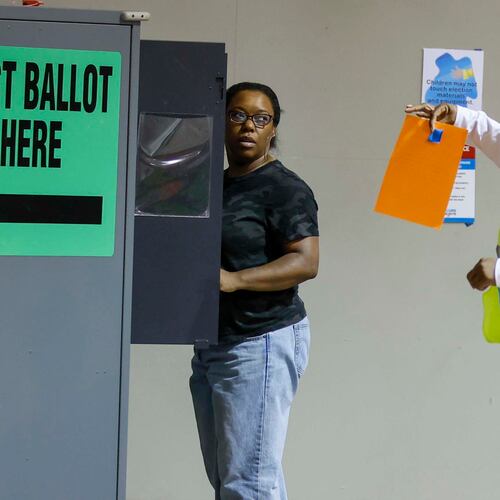FORT GAINES — With a small inheritance, a wicked sense of humor and a commitment to treat the poorest people in the poorest part of the state, Dr. Karen Kinsell has been a lifeline to her patients in southwest Georgia for nearly three decades.
Not only is she the only doctor in her practice, for years she was the only doctor in rural Clay County.
Kinsell came to Fort Gaines, population 995, by way of rural Indiana, where she was born, and New York City, where she graduated from Columbia Presbyterian Medical School. Looking for the right place to work as a doctor, she went to a medical library looking for “the sorriest place I could find,” which turned out to be rural Georgia.
“I’m from a rural area. I understand rural. I’m not afraid of it. And so I wanted to know, ‘Where’s the need?’” she said.
After a brief stint in Albany, Kinsell moved about 60 miles west to Fort Gaines, where some of her patients lived and which studies ranked last in the state for health care access. She set up shop in a repurposed Tastee Freez next to a package store, where she still practices today.
“I see anybody and everybody,” she said. “What makes us a little different is I believe very strongly that there’s a human right to health and health care, and I take that very seriously. So we don’t turn anyone away because they can’t pay.”
Kinsell said she’s doing the best she can for her patients, even in light of the challenges. At 70, she knows she can’t keep her practice forever, but wants to keep practicing for another five years.
About 20% of her patients are uninsured. Of those, she said nearly all are either working or unable to work because of child care obligations or they’re caring for an older relative. While keeping the practice going has never been easy, Kinsell said recent cuts to Medicaid from Republicans’ “Big, Beautiful Bill” and looming reductions in Affordable Care Act subsidies will undoubtedly make it worse.
She had long advocated for Georgia to expand Medicaid.
“I know what Jesus would do. He was really big into feeding the hungry and healing the sick,” she said. “I don’t see people saying, ‘You’re poor, we should kill you.’ But essentially they are saying that.”
Her modest inheritance meant that Kinsell was able early in her career to charge patients $10 per visit or nothing at all if they couldn’t afford it, which she continues to do. During the coronavirus pandemic she started working weekend shifts at urgent care clinics to pay the bills. But she has rarely taken a salary herself.
“I’ve been able to kind of remove myself from the health care system, essentially, and just do what I think is right,” she said. “It’s been a privilege to go to medical school, to have been able to attain these skills that can make people happier and live longer.”
What she thinks is right is treating anyone that comes through her door. That means a typical day for Kinsell and her two-person staff runs from 8 a.m. to 8 p.m., when they’ll see about 30 patients, including some through virtual visits.
On the day we met, one patient showed signs of prostate cancer. Another had a back injury from work. Still another had high blood pressure and a collection of other chronic conditions.
Often, Kinsell finds her patients need more than just tests and prescriptions and that day was no exception. A patient in Albany with a traumatic brain injury needed a new place to live, so she placed a call later that day to social services. A woman from Eufaula, Alabama, was suffering from depression, but Kinsell also asked her, “How are you eating?” She encouraged a different patient from Alabama to apply for senior housing.
“Their current food, housing and transportation issues are all a part of their health problems,” she said. “It affects their ability to get medicine. It affects their ability to make doctors appointments. It affects how depressed they’re going to be.”
Her outspokenness has made her a reluctant media star for national reporters looking for an example of a rural doctor working against the odds of today’s medical system. A PBS documentary featuring Kinsell won a Peabody Award earlier this year.
The exposure brought attention to the critical doctor shortage in rural areas and even donations to her practice, which she used to replace the aging floors. But it hasn’t changed the systemic crisis that she and other health care workers in rural Georgia are facing.
Three hospitals near Fort Gaines have closed in the last 15 years. And the same cuts to Medicaid in the “big, beautiful bill,” which the president signed into law last month, are projected to endanger dozens more across rural Georgia.
“The state of health care in southwest Georgia was grim before and is even more grim now,” said Sherrell Byrd, executive director of SOWEGA Rising, a nonprofit organization in Albany.
“What people don’t understand is that when a hospital closes, it’s like a black hole. It takes the entire medical infrastructure with it,” Byrd said, referring to the specialists, pharmacies and emergency care that all disappeared from rural areas of Georgia when their hospitals closed. “It truly creates a medical desert.”
OB-GYNs, visiting nurses and even ambulances are all in critically short supply, too, she said, including in Clay County. Improving broadband access could bridge some of those gaps by expanding access to telemedicine, she said.
Looking back, Kinsell is the first to admit that her move South wasn’t the easiest adjustment, and still jokingly refers to herself as a “DYB,” short for “damn Yankee b----,” the nickname she quickly got when she moved here. But this is her home now. Along with her medical practice, she served 14 years on the local school board and is on the City Council now.
“I have no regrets at all,” she said with a smile. “It has been such a privilege and such an adventure. I’m so fortunate to have been here and able to make it work.”
About the Author
Keep Reading
The Latest
Featured




